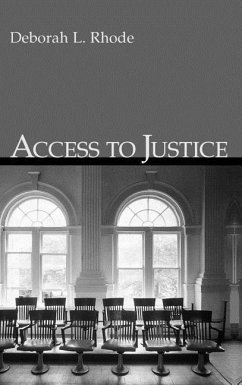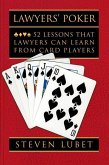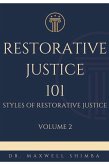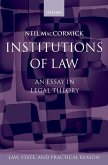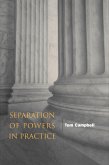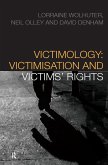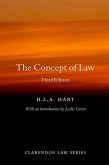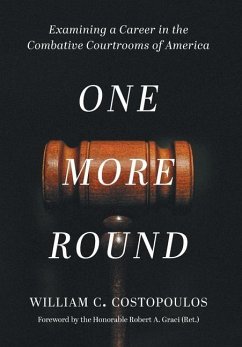Written by America's leading expert on legal ethics, this book vividly chronicles the wide gap between the lofty aspirations and harsh realities of American justice. Avoiding both simplistic lawyer-bashing and liberal lament, Rhode outlines what could and should be done to curb frivolous litigation, though she focuses her attention squarely on the far greater problem of unnecessary expense and unaffordable remedies. A scathing indictment of America's legal status
quo, Rhode presents no mere manifesto but a reasoned and realistic agenda for lasting reform.
"Equal Justice Under Law." This promise appears on courthouse doors across the land. But it by no means describes what goes on inside them. Equal access to justice is one of America's most proudly proclaimed principles. And one of its most frequently violated.
In theory, the United States is deeply committed to individual rights. Yet few Americans can afford the legal representation necessary to exercise them. Only one percent of the nation's lawyers serve our poorest citizens, translating to one lawyer for every 1,400 poor people. The nation with the world's greatest concentration of lawyers has one of the least accessible systems of justice.
Written by America's leading expert on legal ethics, Access to Justice vividly chronicles the wide gap between the lofty aspirations and harsh realities of American justice. As Deborah L. Rhode demonstrates, America is overlawyered and underrepresented: there is too much law for those who can afford it and too little for everyone else. Although indigent defendants are entitled to legal representation, what satisfies that standard is an affront to the civilized world, and
especially shameful for a nation that considers itself a world leader in human rights. Convictions are regularly upheld when lawyers are asleep, on drugs, mentally incapacitated, or even parking their car during the prosecution's case. The justice system is not only inaccessible for the poor; it is increasingly out of
reach for the American middle class as well. Rhode's analysis also includes on the first comprehensive national study of lawyers' charitable pro bono work ever conducted, encompassing some 3,000 attorneys. The average lawyer, she finds, contributes less than half an hour a week and fifty cents a day in support of representation for those who cannot afford it.
Access to Justice avoids both simplistic lawyer-bashing and liberal lament. Rhode outlines what could and should be done to curb frivolous litigation, but focuses her attention squarely on the far greater problem of unnecessary expense and unaffordable remedies. A scathing indictment of America's legal status quo, Access to Justice presents no mere manifesto but a reasoned and realistic agenda for lasting reform.
Hinweis: Dieser Artikel kann nur an eine deutsche Lieferadresse ausgeliefert werden.
quo, Rhode presents no mere manifesto but a reasoned and realistic agenda for lasting reform.
"Equal Justice Under Law." This promise appears on courthouse doors across the land. But it by no means describes what goes on inside them. Equal access to justice is one of America's most proudly proclaimed principles. And one of its most frequently violated.
In theory, the United States is deeply committed to individual rights. Yet few Americans can afford the legal representation necessary to exercise them. Only one percent of the nation's lawyers serve our poorest citizens, translating to one lawyer for every 1,400 poor people. The nation with the world's greatest concentration of lawyers has one of the least accessible systems of justice.
Written by America's leading expert on legal ethics, Access to Justice vividly chronicles the wide gap between the lofty aspirations and harsh realities of American justice. As Deborah L. Rhode demonstrates, America is overlawyered and underrepresented: there is too much law for those who can afford it and too little for everyone else. Although indigent defendants are entitled to legal representation, what satisfies that standard is an affront to the civilized world, and
especially shameful for a nation that considers itself a world leader in human rights. Convictions are regularly upheld when lawyers are asleep, on drugs, mentally incapacitated, or even parking their car during the prosecution's case. The justice system is not only inaccessible for the poor; it is increasingly out of
reach for the American middle class as well. Rhode's analysis also includes on the first comprehensive national study of lawyers' charitable pro bono work ever conducted, encompassing some 3,000 attorneys. The average lawyer, she finds, contributes less than half an hour a week and fifty cents a day in support of representation for those who cannot afford it.
Access to Justice avoids both simplistic lawyer-bashing and liberal lament. Rhode outlines what could and should be done to curb frivolous litigation, but focuses her attention squarely on the far greater problem of unnecessary expense and unaffordable remedies. A scathing indictment of America's legal status quo, Access to Justice presents no mere manifesto but a reasoned and realistic agenda for lasting reform.
Hinweis: Dieser Artikel kann nur an eine deutsche Lieferadresse ausgeliefert werden.

